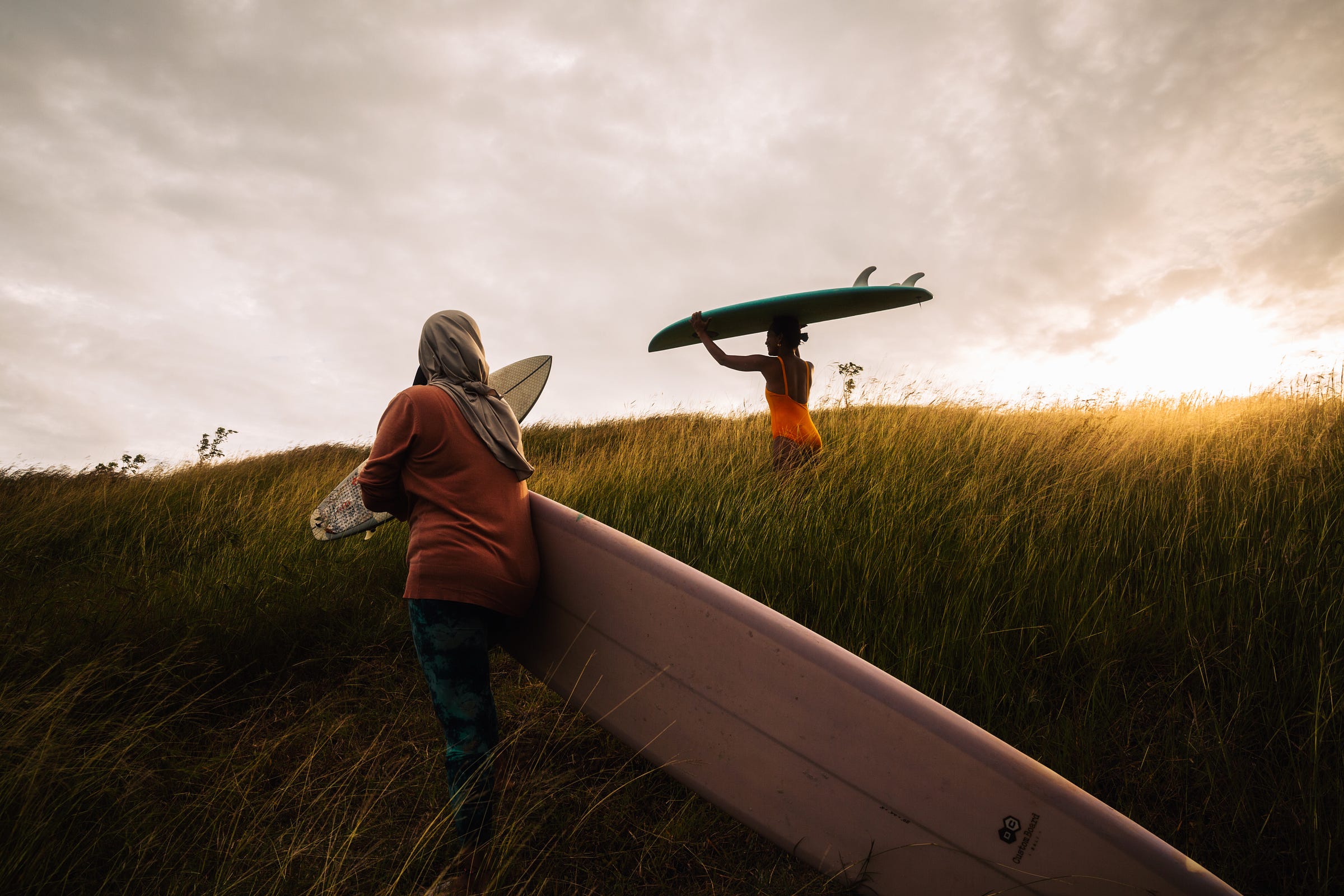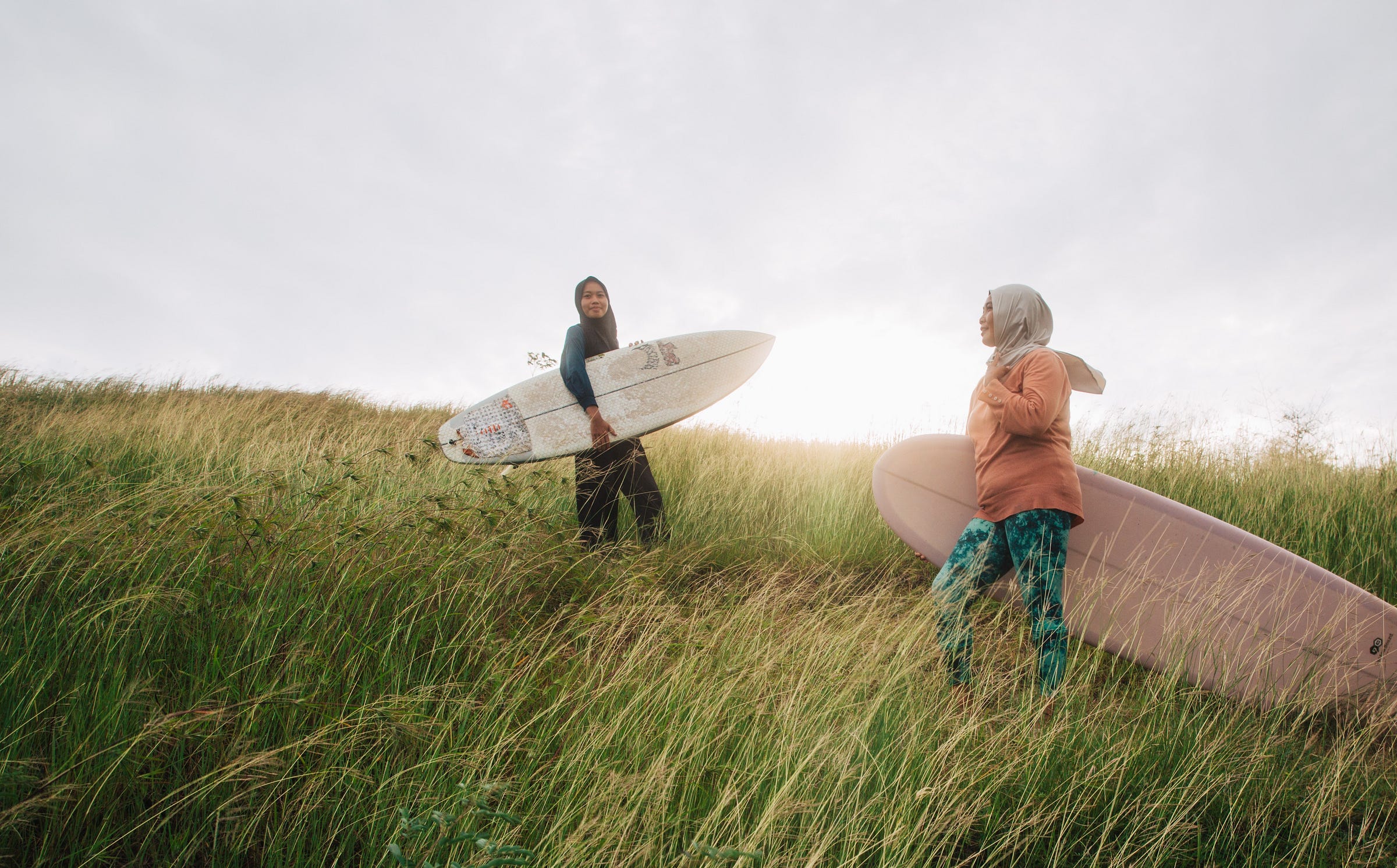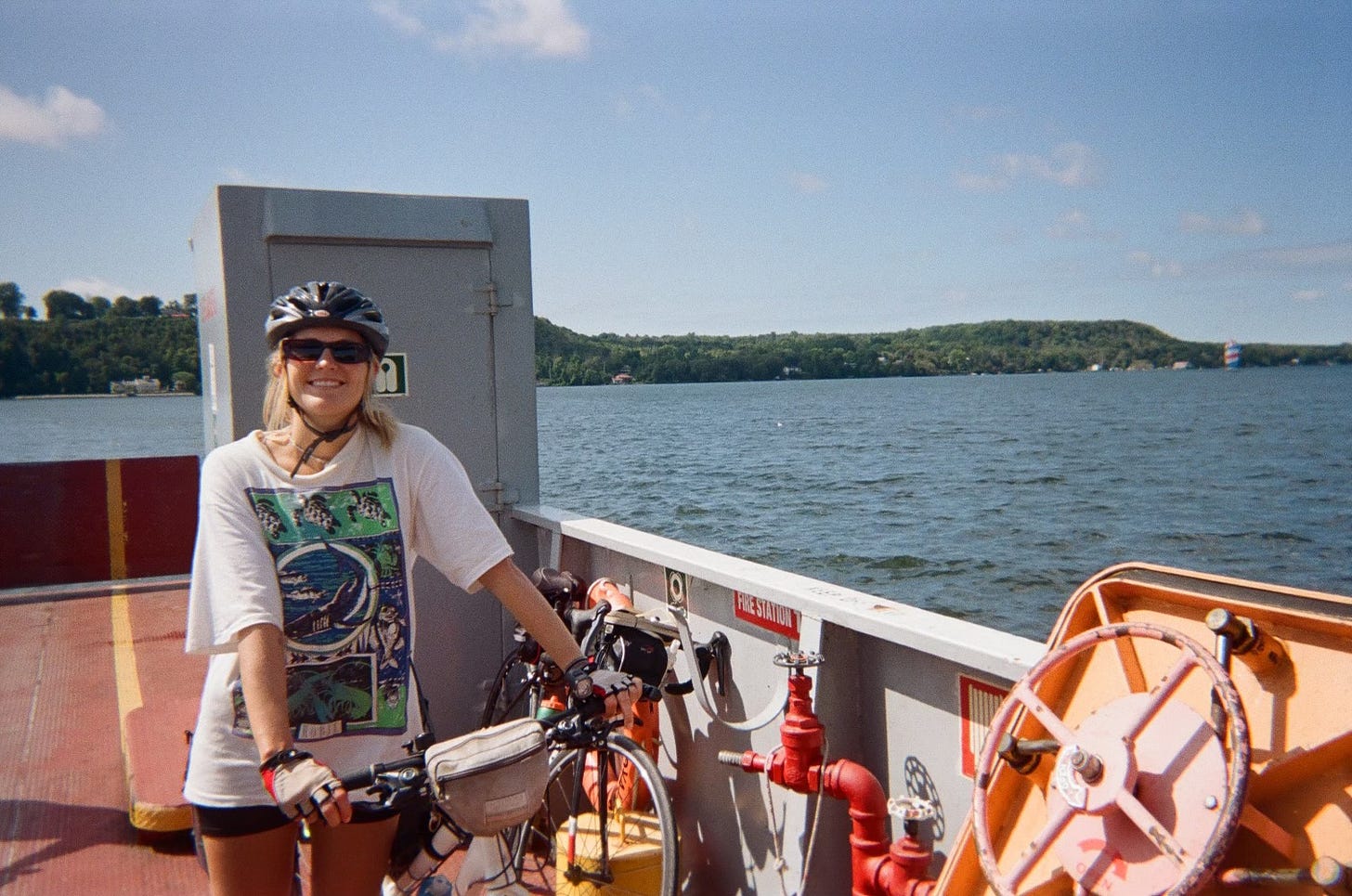OceanFolx and the Women Reshaping Lombok’s Surf Scene
A New Era of Surf and Swim Comes to One of Indonesia's Coastal Paradises
It’s hard to imagine exactly what was going through Maddy Bolt’s mind during her long hours in the saddle—not the proverbial saddle, but the literal bike seat on which she propelled herself across Canada.
At 26 years old, with sweat dripping, wind whipping, and hands clenched to the handlebars, she traversed 2,000 kilometers between Toronto and Halifax—all in pursuit of a dream set in a vastly different landscape.
Now, Bolt sits before me in the opposite hemisphere. We’re a far cry from the cycle lanes of Nova Scotia, perched in a café in one of Sydney, Australia’s classically hip neighborhoods. Cappuccinos cool before us as we discuss not only where all those kilometers have taken Bolt over the years, but also how her journey has impacted the women she’s worked with.
It was this bike trip—the first of many donation campaigns—that enabled Bolt to found and fund OceanFolx.
4,500 kilometers northwest in Lombok, where Bolt resides for the majority of the year, she swaps jeans for shorts and a bike for a surfboard. On the shores of this tropical island, alongside the passionate women in her OceanFolx program, she has catalyzed a quiet yet powerful transformation in the local surf community.
OceanFolx is an educational initiative focused on fostering femme leadership through immersive experiences along Indonesia’s coastlines. Offering swimming, surfing, and conservation curriculum, OceanFolx empowers local women through action sports and a corporeal connection to the sea.
For Bolt, the guiding philosophy of the program is simple: “When you spend more time in the ocean, you're more likely to want to take care of it.”
The challenge, as she discovered, was that many women in Lombok lacked the resources and opportunities to access the sea.
Indonesia has long been celebrated as a mecca for surfing and sailing. The warm, teal waters of the southern archipelago, combined with a variety of reliable breaks, have drawn enthusiasts to Bali and Lombok since the late 1960s. That’s what pulled Bolt here originally, herself a longtime surfer and sailor.
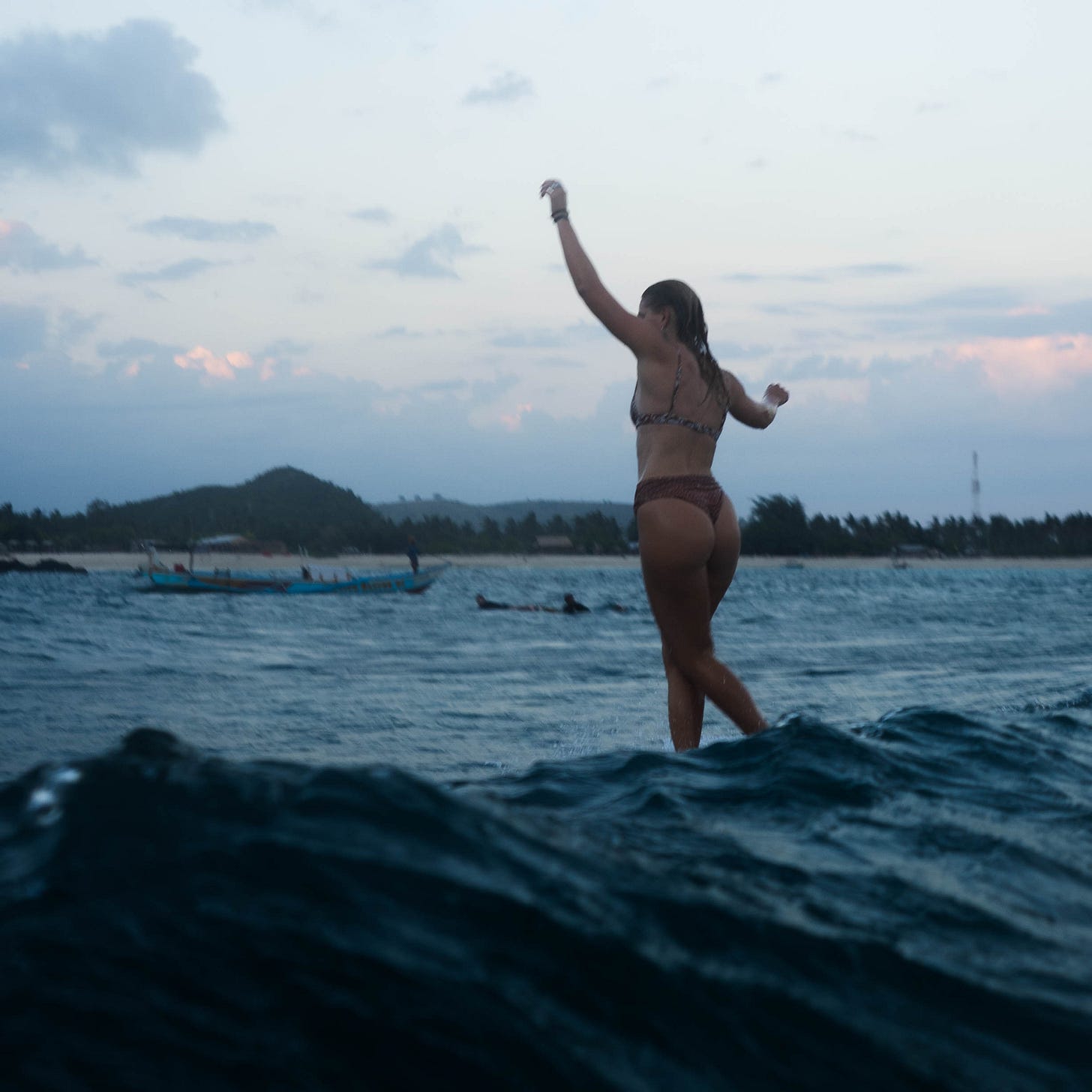
After a Pacific Ocean crossing, she sailed through Indonesia in 2022. As time passed, the landscape’s shores and swells caught hold of her, and she began forming connections with the local community of water lovers and surfers. Day after day, while chasing sets, she couldn’t help but notice the absence of local women in the lineup.
“So many women come here to surf and sail, but none of the local women had the opportunity to explore those things in their own lives.”
And that absence of female faces was not for a lack of interest.
“There wasn’t a group, a community,” emphasized Raimin, OceanFolx’s Local Program Coordinator and one of the previous participants in the program’s 2024 launch initiative.
Nearly all of OceanFolx’s 2024 participants echoed similar sentiments. Their shared experiences in Lombok reflect a broader narrative of underrepresentation across the archipelago. Put simply, women are largely missing from the water.
This disparity became particularly evident when, in 2019, Kailani Johnson made history as the first Indonesian woman to compete in a WSL Championship Tour event, despite the league’s nearly 50-year history.
This lack of visibility is deeply intertwined with cultural and infrastructural barriers that have long prevented women from learning how to swim, effectively cutting them off from the ocean—and by extension, water sports like surfing.
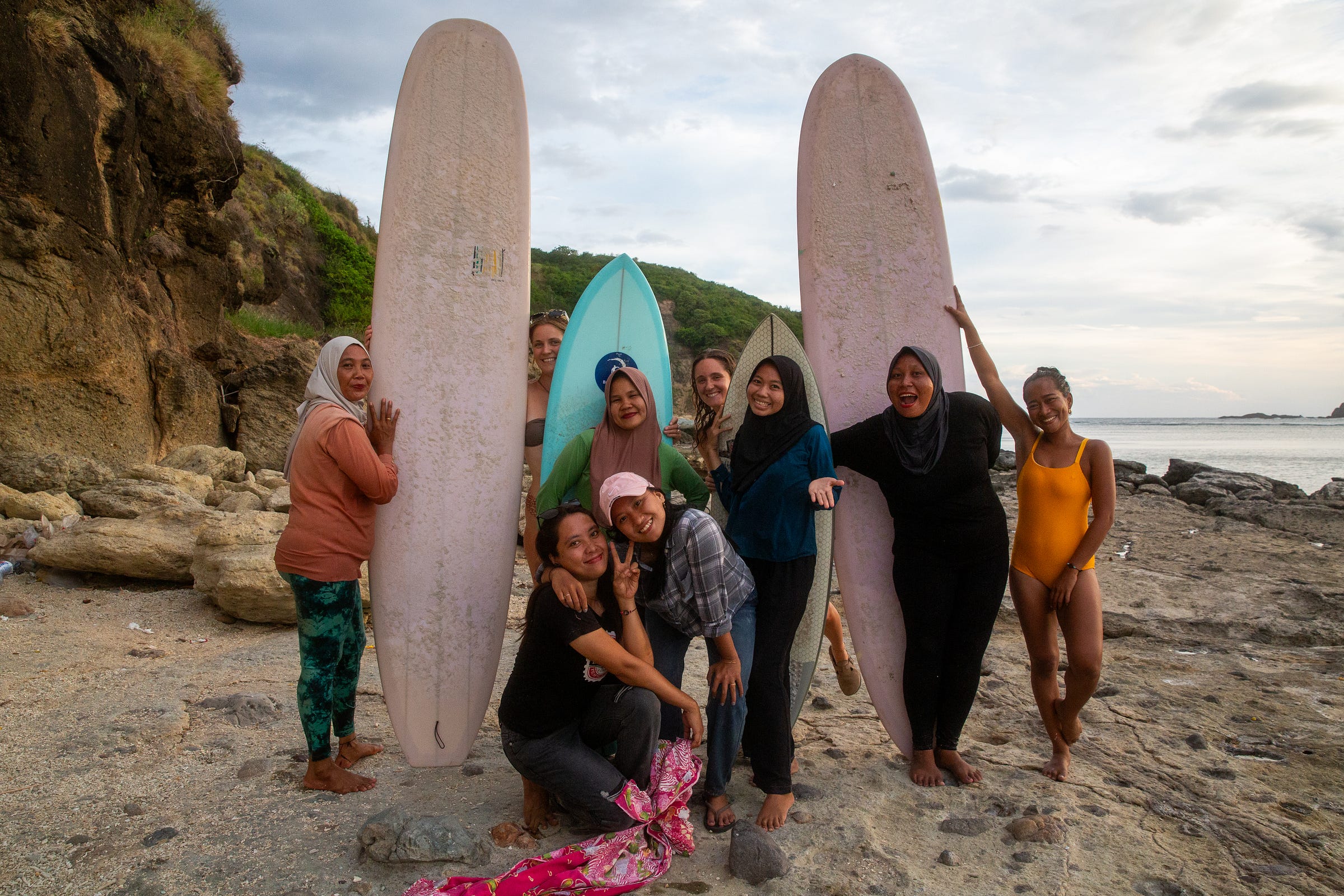
For many participants in OceanFolx’s inaugural program, launched in April of 2024, the conversation wasn’t just about the absence of a community in the water. It was about something more urgent: the glaring lack of opportunities to make the ocean a safer place for them and their communities.
In a culture where swim lessons are often out of reach, the ocean doesn’t become a sanctuary or a place of opportunity—it becomes a place of fear.
“For me, especially, it’s really important to teach my kids and my students how to swim,” stressed Culinjunge Michelle Starjunge, a mother, teacher, and Local Program Coordinator for OceanFolx.
Out of all the nations, Indonesia has the second longest coastline on Earth spanning more 54,716 kilometers. The country likewise experiences some of the highest per capita drowning rates in the world.
A study published in Injury Prevention in August 2024 analyzed unintentional drowning data in Indonesia from 2005 to 2019. The study found that certain demographics remained at higher risk. Specifically, the average annual mortality rate was highest among children under 5 years old, at 9.67 per 100,000 population.
Given Indonesia’s population of approximately 280 million, this translates to nearly 30,000 preventable drowning incidents involving children per year.
In comparison, a 2018 research report from Royal Life Saving indicated that, in Australia, there were 479 drowning deaths in the same age group over a 16-year period (2002 to 2018), averaging about 30 deaths annually.
Based on Australia's population of approximately 26 million, the average number of drowning deaths per 100,000 children under five years old is closer to 0.12 per 100,000. The disparity in water safety between Indonesia and its neighboring nation is vast, with children unfortunately being among the most vulnerable.
Despite Lombok being surrounded by the sea, it’s not a given that most people know how to swim.
“Some of these women would have never even thought about jumping into a pool,” said Bolt.
This is why OceanFolx’s programming places such a strong emphasis on water safety training.
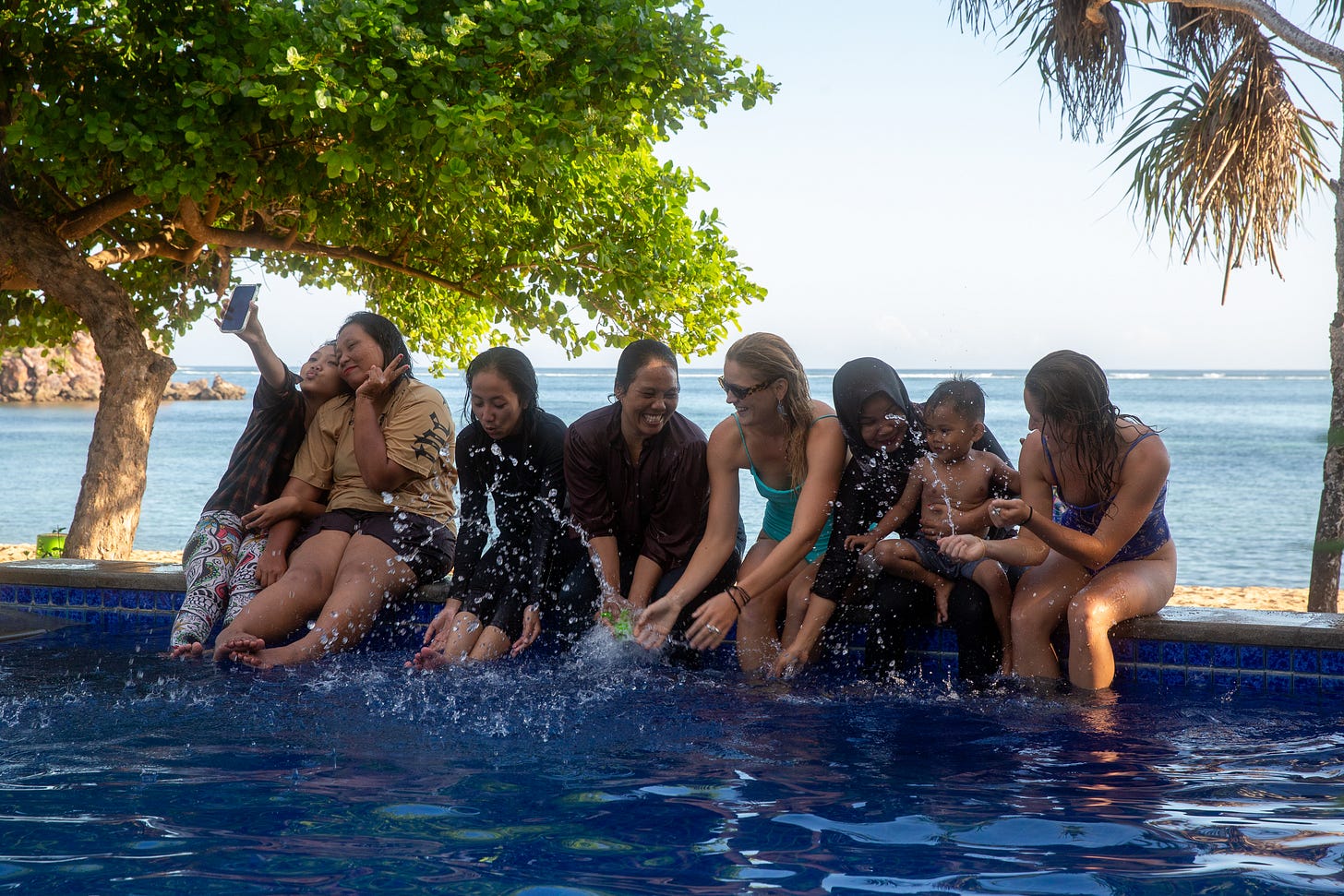
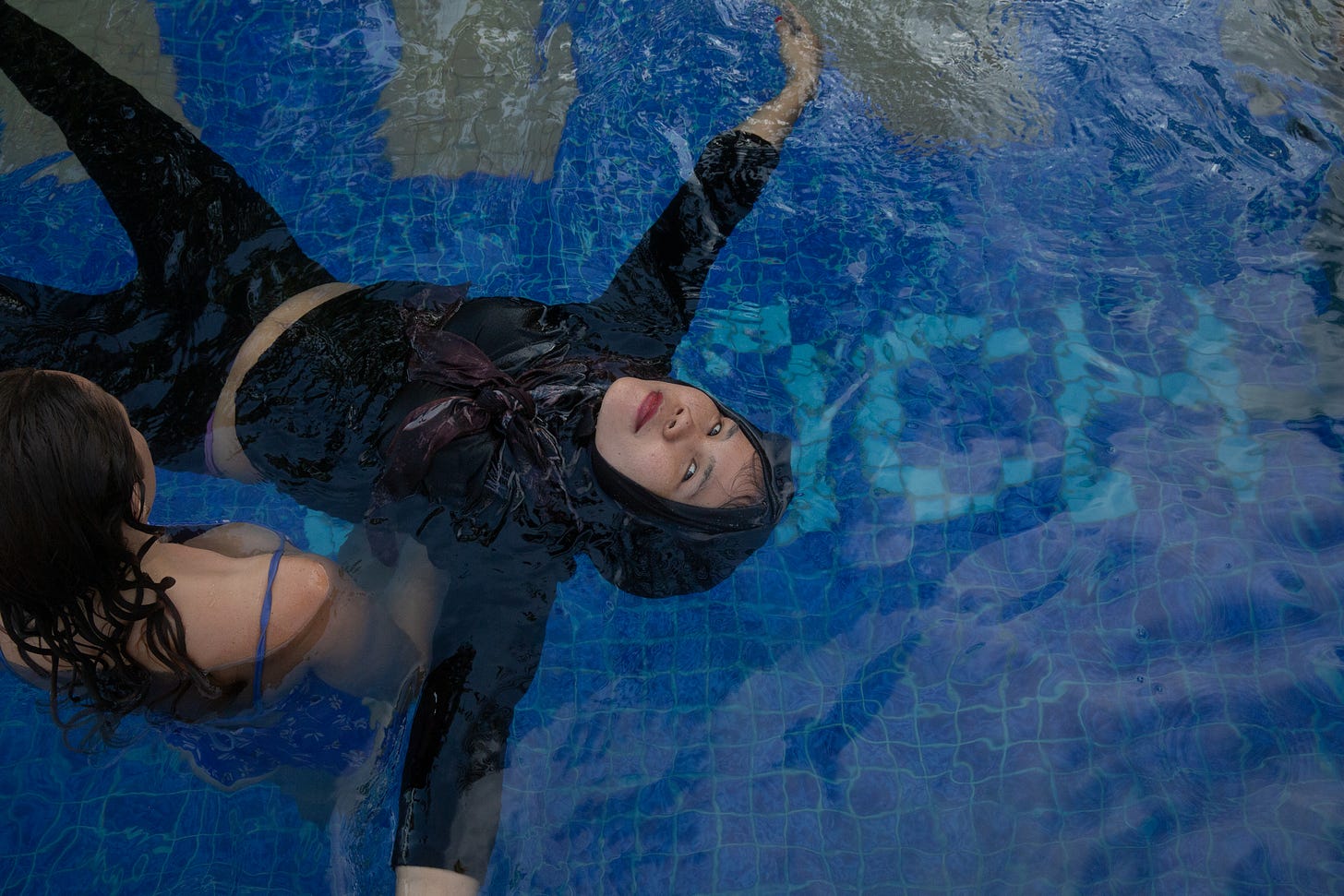
Before stepping into the ocean, Bolt and her team of swim instructors, alongside local Lombok coordinators, guide participants through foundational swim lessons, following the Australian Swimming Curriculum.
The goal is to make the water more approachable, so OceanFolx breaks the training down into three clear steps. First, pool and swim lessons. Second, ocean safety courses, where participants learn to spot rip currents and practice risk management. And third—the highlight of the program—Bolt’s favorite: the surf unit, where the women move from mastering pop-ups on the beach to catching waves in the ocean.
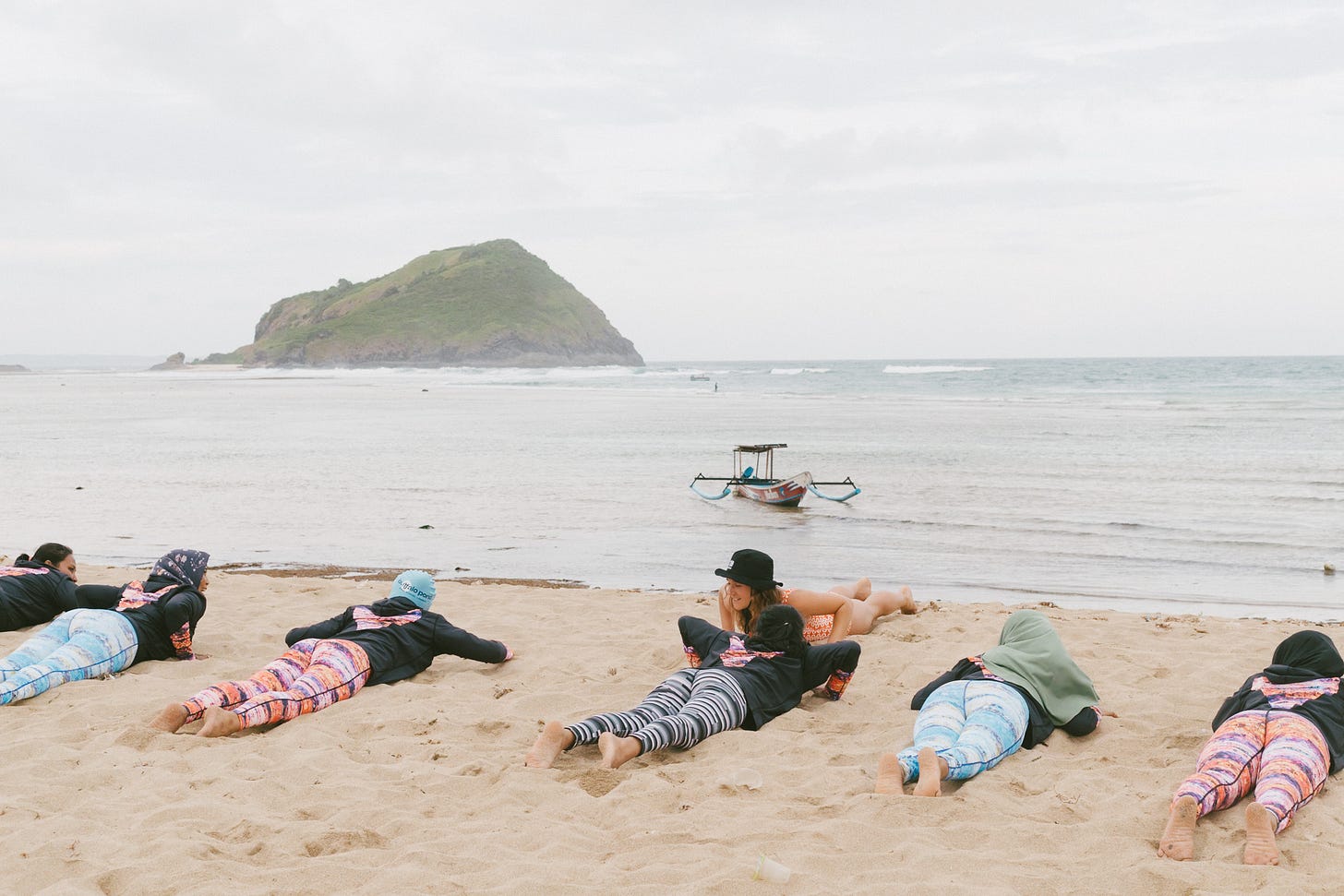
This approach certainly makes surfing more accessible, and so too does another crucial and resolutely unique part of the OceanFolx program: its financial compensation.
Not only is it offered at zero cost to participants, but while enrolled, attendees are also compensated for any income lost or childcare costs incurred. For many of OceanFolx’s participants, finding the time and financial means to prioritize themselves is a rare occurrence, often due to their significant domestic responsibilities.
“For me, especially in Lombok, it’s because women are often too busy once they get married. I work in foreign tourism, so it’s easier for me to ask permission from my husband. Other women have children and are busy with their fields and other responsibilities,” said Culinjunge Michelle Starjunge.
The leadership program additionally covers travel expenses, proving that it’s committed to a comprehensive look at the structures keeping women out of the water.
For Founder Maddy Bolt, addressing and alleviating these financial barriers was always part of the plan. “I want them to come out of this at a gain, not at a loss.”
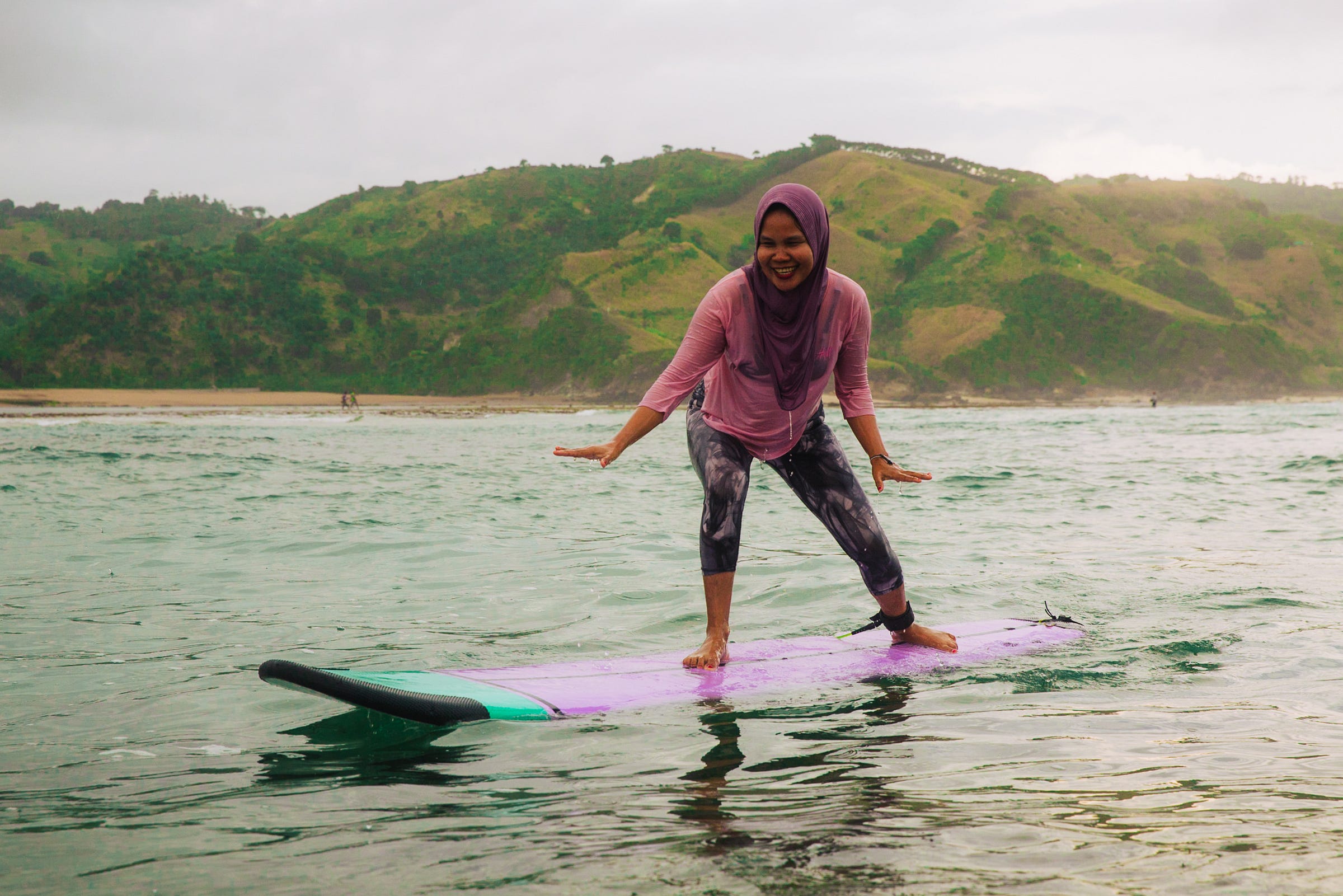
This all-encompassing approach to femme leadership doesn’t stop at its financial policies. Even the title of the program alludes to an expansive perspective on gender and belonging. The “x” in OceanFolx's name and the gender-affirming literature on its website are all part of creating an inclusive space for gender-diverse individuals — another rarity in the surf, conservation, and sailing world at large.
In Indonesia, a nation that has a complex relationship with LGBTQ+ rights and gender identity protections, OceanFolx offers a fresh perspective on womanhood and safe spaces. “No matter where you are in the world, gender diversity exists. It's just whether or not it's tolerated,” said Bolt.
As the saying goes, “Empowered women empower women.” In Lombok, OceanFolx participants are doing just that, uplifting their communities, especially the youth. In a culture where mothers play a central role in the care and education of children, a mother who learns to swim passes those vital life-saving skills on to her children
“The lesson is number one. We are mothers, and therefore, we are teachers,” said Culinjunge Michelle Starjunge.
And the proof is in the results.
Thirteen participants joined OceanFolx’s inaugural 2024 program, where they learned to swim and surf. What followed was even more powerful: the women in this group brought their essential water safety training skills back home, teaching their families—especially their young—that with proper training, the ocean can transform from a place of fear to a place of joy.
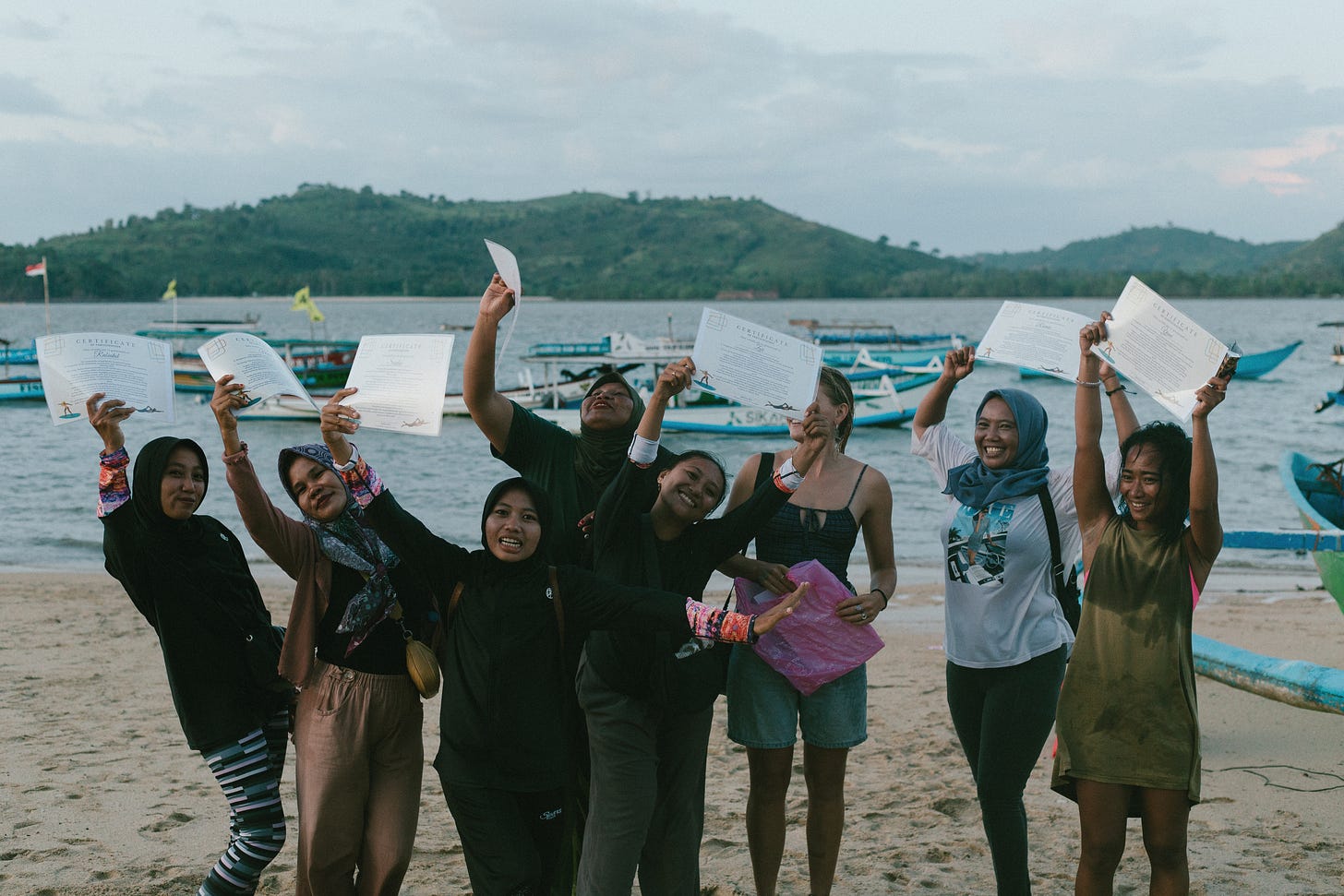
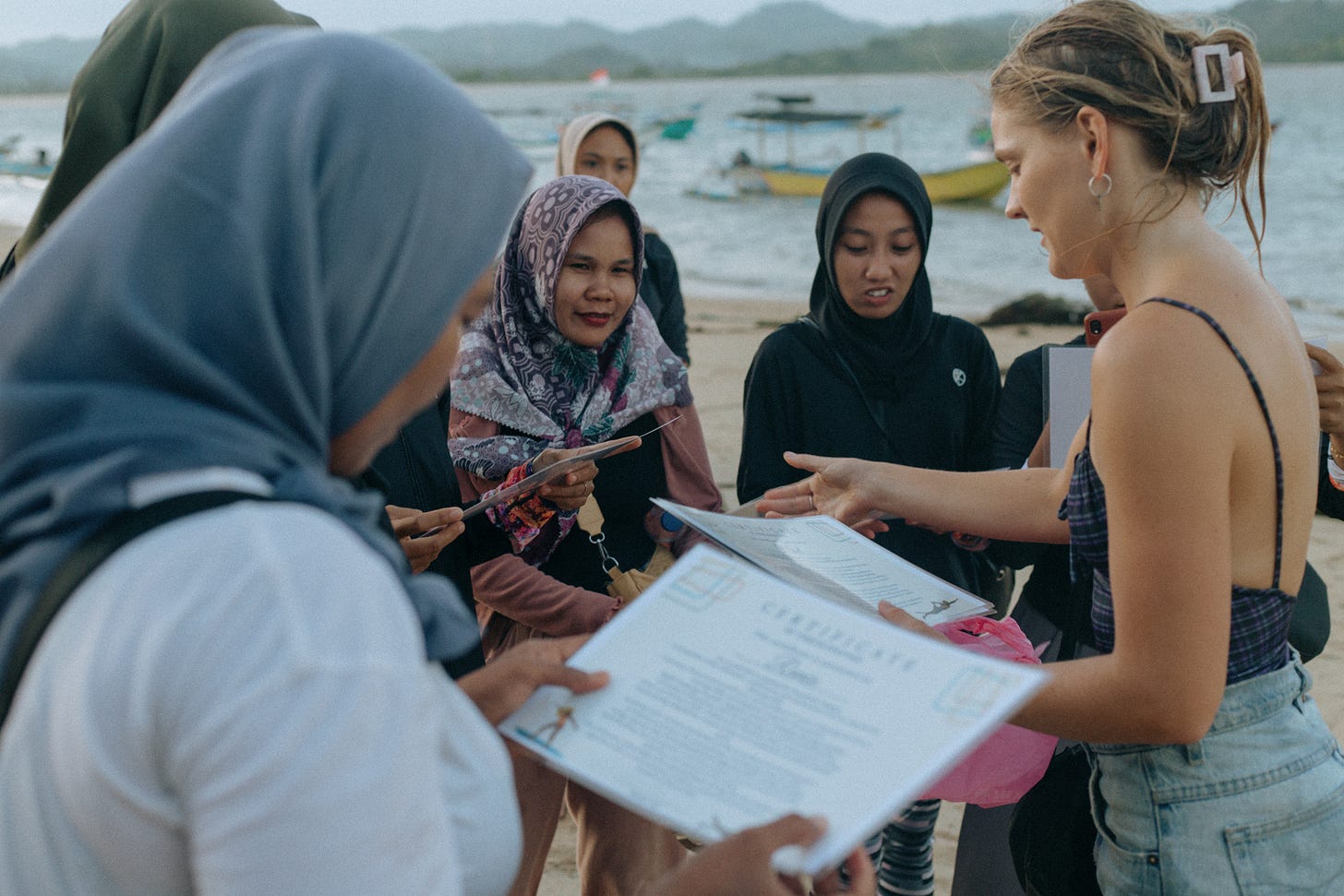
The goal of Bolt’s program is to train and inspire women so that they can become long-term leaders, whether as swim teachers, surf instructors, or ocean advocates. Looking ahead, Bolt will return to her own “saddle”—not on a bike, but back in the waters of Lombok, where she and her team will continue to train a new wave of women in 2025.
Since that first bike ride, Bolt has organized fundraisers, donation campaigns, and a range of events to fully fund the 2024 and 2025 programs, all while compensating participants. She’s set a high standard and example for other organizations.
If she can do it, what’s stopping other nonprofits from offering the same support? How might more initiatives follow Bolt’s lead and take a truly holistic approach to breaking down as many barriers as possible?
In the coming months, several participants from last year’s cohort will return to deepen their connections with the community and support the next generation of surfers. Culinjunge Michelle Starjunge and Raimin will step forward as local guides to lead the next batch of Oceanfolx participants.
“They thought it wasn't possible. I was a beginner. Now, I’m the example,” Culinjunge Michelle Starjunge said with quiet pride.
And, perhaps it was these same words, or the same sentiment, that carried Bolt through the long hours of her cycle trip years ago, reminding her—and us—that big change often grows from small seeds. Here on the shores of Lombok, Bolt’s gumption and her dream have taken root, empowering one woman after another to claim her rightful place in the lineup—or, more broadly, in the water itself.
To learn more about OceanFolx or to donate and support the next group of surfers taking on the waves in Lombok, visit the organization’s website below.
Coral Littlejohn took the majority of the photos in this article. You can find her photography portfolio here. You can find out more about Maddy Bolt and her work by visiting this link.






